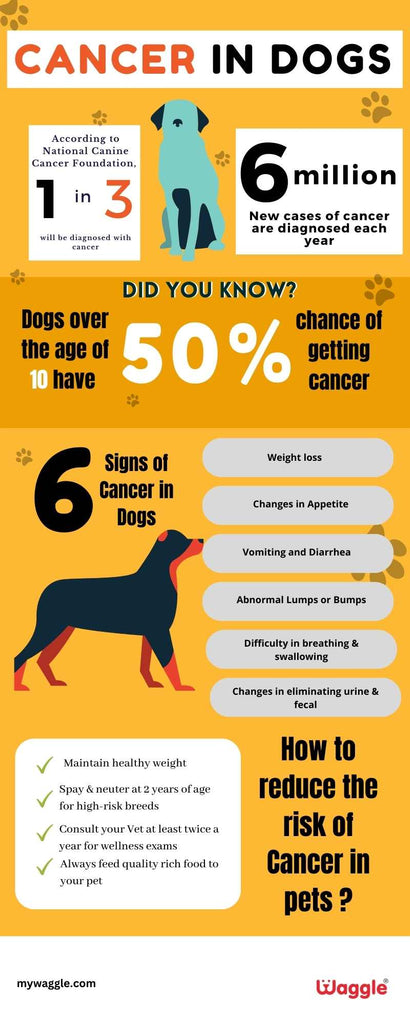Cancer in Dogs - What you need to know about
Cancer is a devastating disease that affects not only humans but also our beloved canine companions. Just like in people, cancer in dogs is a complex and multifaceted condition that requires attention, understanding, and timely intervention. In this comprehensive guide, we'll delve into the world of canine cancer, discussing its causes, symptoms, diagnosis, and treatment options.By the end of this article, you'll have a better understanding of this challenging disease and how to give your furry friend the best possible care.

Causes of Canine Cancer:
Canine cancer can result from a combination of genetic, environmental, and lifestyle factors. Some common factors that can contribute to cancer in dogs include:
Genetics: Certain breeds are predisposed to specific types of cancer.
Age: Older dogs are more prone to developing cancer.
Environmental factors: Exposure to carcinogens such as tobacco smoke or pesticides can increase cancer risk.
Diet: Poor nutrition or a high-calorie diet can be a contributing factor.
Common Types of Canine Cancer:
Dogs can develop various types of cancer, including:
- Lymphoma
- Osteosarcoma
- Mast cell tumors
- Hemangiosarcoma
- Mammary gland tumors
Signs of Cancer in Dogs
#1 Weight loss
Weight loss is one of the most common signs of cancer in pets. If your pet loses weight without changing its diet or exercise routine, it could be a sign of cancer. Cancer can cause your pet to lose its appetite, leading to weight loss. Additionally, cancer can cause your pet's body to burn more calories than usual. If you notice your pet losing weight, it is essential to take them to the vet for a checkup.
Also Read: 5 Dog Health Problems to Never Ignore
#2 Changes in Appetite
Changes in appetite can also be a sign of cancer in pets. If your pet suddenly stops eating or starts eating more than usual, it could be a sign of cancer. Cancer can cause your pet to lose its appetite, leading to weight loss. Additionally, cancer can cause your pet to have an increased appetite, leading to weight gain. If you notice any changes in your pet's desire, it is vital to take them to the vet for a checkup.
#3 Vomiting and Diarrhea
Vomiting and diarrhea are also signs of cancer in pets. Cancer can cause your pet's digestive system to become inflamed, leading to vomiting and diarrhea. Additionally, cancer can cause your pet's body to produce toxins that can make them vomit or have diarrhea. If you notice your pet vomiting or having diarrhea, it is important to take them to the vet for a checkup.
#4 Difficulty Breathing
Difficulty breathing is another sign of cancer in pets. Cancer can cause your pet's lungs to become inflamed, which can make it difficult for them to breathe. Additionally, cancer can cause fluid to build up in your pet's lungs, which can also make it difficult for them to breathe. If you notice your pet having difficulty breathing, it is important to take them to the vet for a checkup.
#5 Lethargy
Cancer can cause your pet to become weak and tired, leading to lethargy. Additionally, cancer can cause your pet's body to produce toxins that can make them feel weak and tired. If you notice your pet becoming lethargic, it is important to take them to the vet for a checkup.
Also Read: Dog Euthanasia – Is it necessary or not?
#6 Abnormal Lumps or Bumps
Abnormal lumps or bumps are also signs of cancer in pets. Cancer can cause tumours on your pet's skin or internal organs, leading to lumps or bumps on their body. Cancer can also cause swelling in your pet's lymph nodes, leading to lumps or bumps on the body. If you notice any lumps or bumps on your pet's body, it is important to take them to the vet for a checkup.
The Bottom-line
It is important to be aware of the signs of cancer in pets and to take them seriously. If you notice these symptoms in your pet, contact your veterinarian immediately. Early detection and treatment of cancer can greatly increase your pet's chances of survival. You can help your pet live a long and healthy life with proper care and attention. What steps are you taking to ensure your pet's health and safety?





